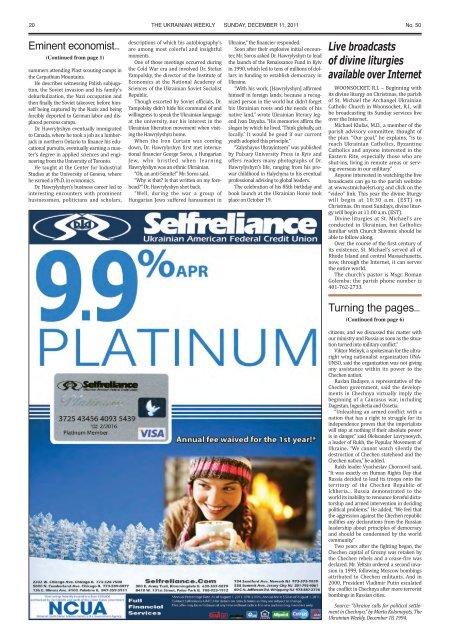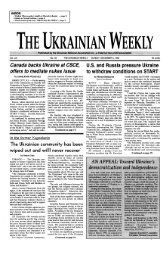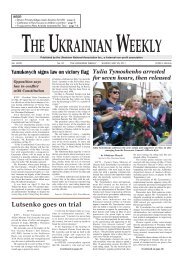Tymoshenko supporters block Rada presidium - The Ukrainian Weekly
Tymoshenko supporters block Rada presidium - The Ukrainian Weekly
Tymoshenko supporters block Rada presidium - The Ukrainian Weekly
You also want an ePaper? Increase the reach of your titles
YUMPU automatically turns print PDFs into web optimized ePapers that Google loves.
20<br />
THE UKRAINIAN WEEKLY SUNDAY, DECEMBER 11, 2011<br />
No. 50<br />
Eminent economist...<br />
(Continued from page 1)<br />
summers attending Plast scouting camps in<br />
the Carpathian Mountains.<br />
He describes witnessing Polish subjugation,<br />
the Soviet invasion and his family’s<br />
dekurkulization, the Nazi occupation and<br />
then finally the Soviet takeover, before himself<br />
being captured by the Nazis and being<br />
forcibly deported to German labor and displaced<br />
persons camps.<br />
Dr. Hawrylyshyn eventually immigrated<br />
to Canada, where he took a job as a lumberjack<br />
in northern Ontario to finance his educational<br />
pursuits, eventually earning a master’s<br />
degree in applied sciences and engineering<br />
from the University of Toronto.<br />
He taught at the Center for Industrial<br />
Studies at the University of Geneva, where<br />
he earned a Ph.D. in economics.<br />
Dr. Hawrylyshyn’s business career led to<br />
interesting encounters with prominent<br />
businessmen, politicians and scholars,<br />
descriptions of which his autobiography’s<br />
are among most colorful and insightful<br />
moments.<br />
One of those meetings occurred during<br />
the Cold War era and involved Dr. Stefan<br />
Yampolsky, the director of the Institute of<br />
Economics at the National Academy of<br />
Sciences of the <strong>Ukrainian</strong> Soviet Socialist<br />
Republic.<br />
Though escorted by Soviet officials, Dr.<br />
Yampolsky didn’t hide his command of and<br />
willingness to speak the <strong>Ukrainian</strong> language<br />
at the university, nor his interest in the<br />
<strong>Ukrainian</strong> liberation movement when visiting<br />
the Hawrylyshyn home.<br />
When the Iron Curtain was coming<br />
down, Dr. Hawrylyshyn first met international<br />
financier George Soros, a Hungarian<br />
Jew, who bristled when learning<br />
Hawrylyshyn was an ethnic <strong>Ukrainian</strong>.<br />
“Oh, an anti-Semite!” Mr. Soros said.<br />
“Why is that? Is that written on my forehead?”<br />
Dr. Hawrylyshyn shot back.<br />
“Well, during the war a group of<br />
Hungarian Jews suffered harassment in<br />
Ukraine,” the financier responded.<br />
Soon after their explosive initial encounter,<br />
Mr. Soros asked Dr. Hawrylyshyn to lead<br />
the launch of the Renaissance Fund in Kyiv<br />
in 1990, which led to tens of millions of dollars<br />
in funding to establish democracy in<br />
Ukraine.<br />
“With his work, [Hawrylyshyn] affirmed<br />
himself in foreign lands, because a recognized<br />
person in the world but didn’t forget<br />
his <strong>Ukrainian</strong> roots and the needs of his<br />
native land,” wrote <strong>Ukrainian</strong> literary legend<br />
Ivan Dzyuba. “His memories affirm the<br />
slogan by which he lived, ‘Think globally, act<br />
locally.’ It would be good if our current<br />
youth adopted this principle.”<br />
“Zalyshayus Ukrayintsem” was published<br />
by Pulsary University Press in Kyiv and<br />
offers readers many photographs of Dr.<br />
Hawrylyshyn’s life, ranging from his prewar<br />
childhood in Halychyna to his eventual<br />
professional advising to global leaders.<br />
<strong>The</strong> celebration of his 85th birthday and<br />
book launch at the <strong>Ukrainian</strong> Home took<br />
place on October 19.<br />
Live broadcasts<br />
of divine liturgies<br />
available over Internet<br />
WOONSOCKET, R.I. – Beginning with<br />
its divine liturgy on Christmas, the parish<br />
of St. Michael the Archangel <strong>Ukrainian</strong><br />
Catholic Church in Woonsocket, R.I., will<br />
be broadcasting its Sunday services live<br />
over the Internet.<br />
Michael Klufas, M.D., a member of the<br />
parish advisory committee, thought of<br />
the plan. “Our goal,” he explains, “is to<br />
reach <strong>Ukrainian</strong> Catholics, Byzantine<br />
Catholics and anyone interested in the<br />
Eastern Rite, especially those who are<br />
shut-ins, living in remote areas or serving<br />
overseas in our military.”<br />
Anyone interested in watching the live<br />
broadcasts can go to the parish website<br />
at www.stmichaelsri.org and click on the<br />
“video” link. This year the divine liturgy<br />
will begin at 10:30 a.m. (EST) on<br />
Christmas. On most Sundays, divine liturgy<br />
will begin at 11:00 a.m. (EST).<br />
Divine liturgies at St. Michael’s are<br />
conducted in <strong>Ukrainian</strong>, but Catholics<br />
familiar with Church Slavonic should be<br />
able to follow along.<br />
Over the course of the first century of<br />
its existence, St. Michael’s served all of<br />
Rhode Island and central Massachusetts,<br />
now, through the Internet, it can serves<br />
the entire world.<br />
<strong>The</strong> church’s pastor is Msgr. Roman<br />
Golemba; the parish phone number is<br />
401-762-2733.<br />
Turning the pages...<br />
(Continued from page 6)<br />
citizens, and we discussed this matter with<br />
our ministry and Russia as soon as the situation<br />
turned into military conflict.”<br />
Viktor Melnyk, a spokesman for the ultraright<br />
wing nationalist organization UNA-<br />
UNSO, said the organization was not giving<br />
any assistance within its power to the<br />
Chechen nation.<br />
Ruslan Badayev, a representative of the<br />
Chechen government, said the developments<br />
in Chechnya virtually imply the<br />
beginning of a Caucasus war, including<br />
Dagestan, Ingushetia and Ossetia.<br />
“Unleashing an armed conflict with a<br />
nation that has a right to struggle for its<br />
independence proves that the imperialists<br />
will stop at nothing if their absolute power<br />
is in danger,” said Oleksander Lavrynovych,<br />
a leader of Rukh, the Popular Movement of<br />
Ukraine. “We cannot watch silently the<br />
destruction of Chechen statehood and the<br />
Chechen nation,” he added.<br />
Rukh leader Vyacheslav Chornovil said,<br />
“It was exactly on Human Rights Day that<br />
Russia decided to lead its troops onto the<br />
territory of the Chechen Republic of<br />
Ichkeria… Russia demonstrated to the<br />
world its inability to renounce forceful dictatorship<br />
and armed intervention in deciding<br />
political problems.” He added, “We feel that<br />
the aggression against the Chechen republic<br />
nullifies any declarations from the Russian<br />
leadership about principles of democracy<br />
and should be condemned by the world<br />
community.”<br />
Two years after the fighting began, the<br />
Chechen capital of Grozny was retaken by<br />
the Chechen rebels and a cease-fire was<br />
declared. Mr. Yeltsin ordered a second invasion<br />
in 1999, following Moscow bombings<br />
attributed to Chechen militants. And in<br />
2000, President Vladimir Putin escalated<br />
the conflict in Chechnya after more terrorist<br />
bombings in Russian cities.<br />
Source: “Ukraine calls for political settlement<br />
in Chechnya,” by Marta Kolomayets, <strong>The</strong><br />
<strong>Ukrainian</strong> <strong>Weekly</strong>, December 18, 1994.

















